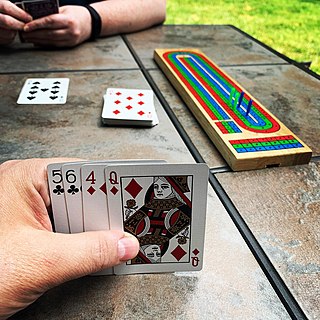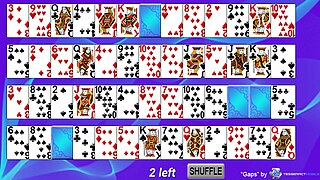Related Research Articles

Klondike, also known as Canfield, is a card game for one player and the best known and most popular version of the patience or solitaire family, something which "defies explanation" as it has one of the lowest rates of success of any such game. Partly because of that, it has spawned numerous variants including Batsford, Easthaven, King Albert, Thumb and Pouch, Somerset or Usk and Whitehead, as well as the American variants of the games, Agnes and Westcliff. The distinguishing feature of all variants is a triangular layout of the tableau, building in ascending sequence and packing in descending order.

FreeCell is a solitaire card game played using the standard 52-card deck. It is fundamentally different from most solitaire games in that very few deals are unsolvable, and all cards are dealt face-up from the very beginning of the game. Although software implementations vary, most versions label the hands with a number.
In poker, the probability of each type of 5-card hand can be computed by calculating the proportion of hands of that type among all possible hands.

Cribbage, or crib, is a card game, traditionally for two players, that involves playing and grouping cards in combinations which gain points. It can be adapted for three or four players.

Simple Simon is a patience or solitaire card game played with a regular 52 cards deck. It is a close relative of the well-known Spider Solitaire. It became somewhat popular being featured in some computerized collections of Solitaire card games, but its origins possibly predate its implementation as a computerized game.
Perpetual Motion is a Patience game which has the objective of discarding playing cards from the tableau. The name relates to the time-consuming process of the game. It is also called Idiot's Delight or Narcotic.
Gargantua is a patience or solitaire card game that is a version of Klondike using two decks. It is also known as Double Klondike and as Jumbo.

Gaps is a member of the Montana group of Patience games, where the goal is to arrange all the cards in suit from Deuce to King.

Napoleon at St Helena is a 2-deck patience or solitaire card game for one player. It is quite difficult to win, and luck-of-the-draw is a significant factor. The Emperor Napoleon often played patience during his final exile to the island of St Helena, and this is said to be the version he probably played. Along with its variants, it is one of the most popular two-deck patiences or solitaires. The winning chances have been estimated as 1 in 10 games, with success typically dependent on the player's ability to clear one or more columns. The game is the progenitor of a large family of similar games, mostly with variations designed to make it easier to get out.
Canfield (US) or Demon (UK) is a patience or solitaire card game with a very low probability of winning. It is an English game first called Demon Patience and described as "the best game for one pack that has yet been invented". It was popularised in the United States in the early 20th century as a result of a story that casino owner Richard A. Canfield had turned it into a gambling game, although it may actually have been Klondike and not Demon that was played at his casino. As a result it became known as Canfield in the United States, while continuing to be called Demon Patience in the United Kingdom and elsewhere. It is closely related to Klondike, and is one of the most popular games of its type.

Scorpion is a patience or solitaire card game using a deck of 52 playing cards. Although somewhat related to Spider, the method of game play is akin to Yukon. The object of this game is to form four columns of suit sequence cards from king down to ace.
Stalactites is a solitaire card game which uses a deck of 52 playing cards. The game is similar to Freecell, but it is different because of the way building onto the foundations and the tableau.
Hit or Miss is a patience or card solitaire that uses a deck of 52 playing cards. It is an unusual one in that the player deals the cards one at a time. The game is significantly based on luck-of-the-draw, but the process of elimination gives it appeal nonetheless.
Cribbage solitaire is a solitaire card game using a deck of 52 playing cards. It is based on the game of five-card cribbage, also known as the "old game", and is one of many solitaire card games based on those played by at least two players, best known of which is poker solitaire.
Royal Cotillion is a solitaire card game which uses two decks of 52 playing cards each. The name probably derives from the fact that since the two kings and two queens of the same suit, the king and queen of each suit dance the cotillion. It has been given the alternate name of Lords and Ladies because if the game is won, the final layout will show the king and queen of each suit together.
Mrs. Mop is a patience or solitaire card game which is played using two decks of playing cards. Invented by Charles Jewell, it is a relative of the solitaire game Spider in which all of the cards are dealt face up at the beginning of the game. The game seems easy at first, but when played, winning is difficult and it is rare to be able to complete the game successfully.
Penguin is a patience or solitaire card game, invented by David Parlett, which uses a deck of 52 playing cards. The game play is similar to solitaire card games like the popular Freecell and its predecessor Eight Off.
Leoni's Own is a 19th century American card solitaire played with two decks of playing cards shuffled together. This game may have come from Austria, takes approximately 20 minutes and is described as medium regarding difficulty and also uses an ingenious method called weaving. It is often confused by card game book writers with Weaver's which has a similar mode of play but different rules and terminology.
The Plot is a Patience game which is played with two decks of playing cards.
Moojub is a solitaire card game which is played using one deck of playing cards. It was invented by Geoffrey Mott-Smith and Albert H. Morehead.
References
- ↑ Vos Savant, Marilyn (21 August 1994). "Ask Marilyn: A hat check problem", Parade Magazine. Retrieved 23 October 2020.
- ↑ Doyle, Peter G.; Grinstead, Charles M.; Laurie Snell, J. (2 April 2009). "Frustration Solitaire", arXiv:math/0703900 . Retrieved 23 October 2020,
